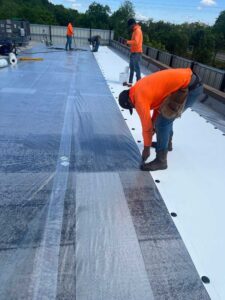
When it comes to commercial buildings, having a reliable and durable roofing system is crucial. Flat roofs have become a popular choice for commercial properties due to their unique features and numerous benefits. In this article, we will explore the key aspects of Nettleton commercial flat roofing, including flat roofing systems, materials used, benefits, common challenges, choosing the right contractor, and future trends in the industry.
Understanding Flat Roofing Systems
Flat roofing systems are specifically designed for buildings with low-pitched or completely flat roofs. Unlike traditional sloped roofs, flat roofs consist of a horizontal or nearly horizontal surface, allowing for easy installation, maintenance, and accessibility. Let’s take a closer look at the key features of flat roofs.
Flat roofs have been a popular choice for commercial and industrial buildings for many years due to their practicality and versatility. One additional advantage of flat roofs is their cost-effectiveness, as they require fewer materials and less labor compared to pitched roofs. This makes them a budget-friendly option for large-scale projects or buildings with expansive roof areas.
Key Features of Flat Roofs
Flat roofs have several distinctive features that make them suitable for commercial buildings. First and foremost, their horizontal design offers enhanced space utilization, making them ideal for rooftop installations such as HVAC units, solar panels, or even rooftop gardens. Additionally, flat roofs provide easy accessibility for maintenance and repairs, which can help minimize disruption to the building’s operations.
Moreover, the design of flat roofs allows for the efficient collection of rainwater, which can be utilized for various purposes such as irrigation or greywater systems. This eco-friendly aspect of flat roofs contributes to sustainable building practices and can help reduce water consumption and runoff in urban areas.
Materials Used in Flat Roofing
The materials used in flat roofing systems play a vital role in their overall performance and longevity. Popular options include built-up roofing (BUR) membranes, modified bitumen, EPDM (ethylene propylene diene monomer), TPO (thermoplastic olefin), and PVC (polyvinyl chloride) membranes. Each material has its own unique characteristics, offering different levels of durability, weather resistance, and maintenance requirements.
When selecting the appropriate roofing material for a flat roof, factors such as climate, building usage, and budget should be taken into consideration. For example, EPDM membranes are known for their excellent weather resistance and flexibility, making them suitable for areas with extreme temperature fluctuations. On the other hand, PVC membranes are highly reflective and energy-efficient, making them a popular choice for buildings seeking to reduce cooling costs and environmental impact.
Benefits of Flat Roofing for Commercial Buildings
Choosing a flat roofing system for your commercial building can bring numerous advantages. Here are some key benefits.
Space Utilization and Accessibility
The flat surface of these roofs allows for efficient utilization of space. Rooftop installations like HVAC units or renewable energy systems can be easily incorporated without taking up valuable floor space. Moreover, the straightforward design of flat roofs ensures accessibility for maintenance personnel, simplifying the inspection and repair process.
Additionally, the spacious nature of flat roofs opens up possibilities for creating rooftop gardens or recreational areas for employees. These green spaces not only enhance the aesthetic appeal of the building but also provide a relaxing environment for occupants to unwind during breaks, promoting employee well-being and productivity.
Cost-Effectiveness and Energy Efficiency
Flat roofs are typically more cost-effective to install and maintain compared to sloped roofs. The simplicity of the design reduces labor and material costs during installation, while the accessibility aids in swift repairs, minimizing potential damage. Flat roofs also provide opportunities for energy-efficient strategies, such as the installation of cool roof coatings or solar panels, which can lower heating and cooling costs in the long run.
Moreover, the flat surface of these roofs allows for easy integration of rainwater harvesting systems, contributing to sustainability efforts and reducing water consumption. By capturing and utilizing rainwater for irrigation or other non-potable uses, businesses can further reduce their environmental impact and operating costs, showcasing a commitment to eco-friendly practices.
Common Challenges with Commercial Flat Roofs
While flat roofs offer numerous benefits, they also come with their fair share of challenges. Understanding and addressing these challenges is essential for maintaining the integrity of the roof and avoiding costly repairs in the future.
Drainage Issues and Solutions
One common challenge faced by flat roofs is poor drainage. Without a sufficient slope, water can accumulate and cause leaks or structural damage over time. To mitigate this issue, flat roofs incorporate various drainage systems, such as scuppers, gutters, and internal drains, to ensure proper water runoff. Regular roof inspections and maintenance can help identify and address drainage problems promptly.
Maintenance and Repair Considerations
Maintaining a flat roof involves regular inspections to detect any signs of damage, such as cracks, membrane deterioration, or ponding water. Prompt repairs are crucial to prevent leaks and extend the lifespan of the roof. It is advisable to consult a professional roofing contractor with experience in flat roof systems to carry out these inspections and provide recommendations for maintenance and repairs.
Choosing the Right Flat Roofing Contractor in Nettleton
When it comes to installing, maintaining, or repairing commercial flat roofs in Nettleton, selecting the right roofing contractor is essential. Here are some factors to consider:
Factors to Consider When Hiring a Contractor
When evaluating roofing contractors, consider their experience, expertise, and reputation in handling flat roofing projects. Look for professionals who specialize in commercial roofing and have a track record of successful installations and repairs. Additionally, ensure that the contractor is licensed, insured, and provides warranties on their workmanship and materials.
Services Offered by Nettleton Roofing Professionals
Nettleton roofing professionals offer a wide range of services related to commercial flat roofing. These services include roof installation, maintenance, repair, and replacement. They are well-versed in different flat roofing systems and materials, ensuring that your commercial building is equipped with a reliable and long-lasting roof.
Future Trends in Commercial Flat Roofing
The roofing industry is constantly evolving, and flat roofing systems are no exception. Let’s explore some future trends and advancements that may shape the commercial flat roofing industry.
Sustainable and Eco-friendly Roofing Options
With increasing environmental awareness, there is a growing demand for sustainable and eco-friendly roofing solutions. Green roof systems, for example, integrate vegetation and planting beds on the rooftop, providing benefits such as improved energy efficiency, stormwater management, and increased biodiversity. Furthermore, advancements in material technology are leading to the development of more environmentally friendly roofing materials.
Technological Advancements in Roofing Systems
The roofing industry is embracing technological advancements to enhance the performance and durability of flat roofing systems. Innovative solutions, like thermographic inspections, can help detect moisture and insulation issues, preventing potential leaks or energy loss. Additionally, advancements in coating technology are improving the longevity and weather resistance of flat roofs.
Conclusion
In conclusion, Nettleton commercial flat roofing offers numerous benefits for commercial buildings, such as enhanced space utilization, cost-effectiveness, and energy efficiency. However, it is essential to address common challenges, including drainage issues and maintenance considerations, to ensure the longevity and reliability of the roof. By choosing the right roofing contractor with experience in flat roofing systems, you can feel confident that your commercial property will be equipped with a durable and high-performance roof. As the industry continues to evolve, sustainable and technologically advanced roofing options will play a significant role in the future of commercial flat roofing.
Ready to ensure your Nettleton commercial property is equipped with a top-tier flat roofing system that offers unmatched durability and performance? Look no further than Commercial Roofing Rana. With a legacy of excellence since 1983, our team of licensed professionals specializes in the installation of Duro-Last roofing systems, providing superior protection for a diverse range of commercial buildings across the Mid-South. From industrial facilities to shopping centers, we’ve got you covered. Don’t let water damage threaten your business—Schedule Now with Commercial Roofing Rana and secure your investment with our reliable roofing solutions.
